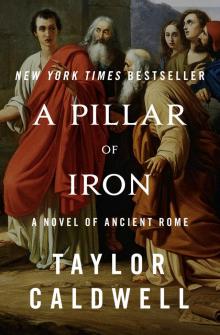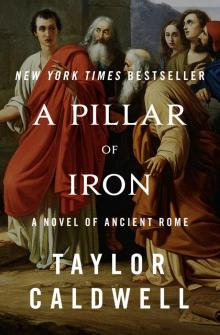- Home
- Taylor Caldwell
Dialogues With the Devil Page 3
Dialogues With the Devil Read online
Page 3
Yet, Our Father chose to take on the flesh of this miserable small creature, this blind little mouse, this impudent manikin. This has angered and insulted you, as you have said so often through the eons. But God did not do this to torment you, as you say. He does not inflict suffering on His children. He had His reasons. You have written that if He does not erase the memory of man from all the planets, not only Terra, you will do it. That cannot be, unless He wills that you have your will. It is true that He sank ancient continents of Terra below the waters, and you exulted that the race was destroyed. But he rescued a few, and raised up other continents for their life and fertility and their ultimate hope. Your thunderbolts did not destroy the ark as it rose and fell on the vast and landless seas, nor were the inhabitants affrighted. It was not the will of Our Father that they be lost, but that they have life. There may come a day when God shall will that you have your way, but that day lives only in His mind, and you cannot know it.
You will have no pity. It was absurd of me to ask it, for I know your loathing for this bloody little ball of mud which committed the great crime of Deicide, and continues to commit it. Nevertheless, your very wrath against it gives me heart, for it was out of your love for Our Father that you have found Terra so outrageous. But even if God had chosen Madra, the most beautiful and splendid planet in all the universes, to be born of her, you would still have been fired with anger, for men live on Madra also, and mankind is your curse. You tempted man to fall ten thousand times ten thousand eons ago, and when he fell you fell with him also. He is your anathema as you are his. When he echoes you and blasphemes, it does not rejoice you. You would obliterate him for the very words you taught him! You would kill him for the evils he has embraced, though you invented those evils and filled his arms with them.
It is man’s weakness before you that fills you with fury, yet you touch him with weakness in his mother’s womb. When you say to him, “I am your only god, your only reality,” and he bows before you in worship, you would smite him unto immediate death. Ah, Lucifer, once Star of Morning, you are the very father of man’s incredible infamy, and while you demand his adoration you simultaneously demand that he die!
This is not a marvel to me, you who are a slave of slaves. But it is my sorrow. It is the sorrow of all your brothers also. But, who knows? One fair noon you may arise to the gates of Heaven on the ladder raised by men, and in striking on them you may cry, “Alleluia!”
Your brother, Michael
Greetings to my brother, Michael, who is very tender and brave but, alas, most naïve:
Let me repeat as I have repeated always: If my entry into heaven must be accompanied by the souls of men, then I prefer my hells. At least there I torment my insulters and the insulters of Our Father, and this is an exuberant delight, one, I fear, you will never know.
Delight! Most assuredly! It is a joy which I cannot explain in words you would understand. Sufficient it is to say that I play with those souls as they played with their victims, and with the same mercilessness, only a thousand times enhanced. When they beseech me for pity I listen with ecstasy to their cries. Beasts, animals! To think that they, too, possess immortal life! They grovel before me and clutch my garments and I spurn them with my foot. Sometimes I admit a few of their wisest to my dark tabernacle and converse with them for the pleasure of listening to their stupidity, their arrant foolishness. Often I summon the great among them and urge them to speak of their fame on Terra, and it is an enormous amusement. They say to me, “I did not believe in you, nor in God, yet you manifestly are,” and they marvel. I conjure their lives before them and I say, “There was I, in that apparition, when you planned this—or that—and you heard my voice and took rapture in it. Why did you harken to me, beast of beasts?” They answer, falling before my face, “I believed in nothing but myself and my own grandeur and my own will.” But they believed in me.
They repent. But it is too late. They came to me, not through august sins which at least possess a measure of grandeur and imagination, but through sins so mean and contemptible that they are below the comprehension of the lowest of creatures on Terra. The serpent in the forest is not as poisonous as man, the rabid bat is not as mad and loathsome, the toothed shark is not so foul a scavenger. For none of these can lie. That is the prerogative of man only. Man always takes on the aspect of the serpent, the bat and the shark, and their habits. He is more dreadful than these, for he lacks their innocence and he knows what he does and he does it with enthusiasm and passion. It is through his lies that man comes to me, his lies of the flesh and the spirit, for untruth is a perversion and man is a pervert. He is the incarnation of the lie which is myself, and all the evil that he does is his corruption of truth.
You have asked for my pity on him. If I did not love you, Michael, I should feel myself forever insulted, and should then hate you.
My demons look upon the bountiful harvests of the souls of men who swarm through my fiery portals each hour, and they look with revulsion, for never, even among demons, was ever a spirit so malicious, so embued with hatred for his fellows, as the spirit of man. In his life on Terra he prates of love and esteems it with his tongue as the greatest of virtues. Yet never was a creature so loveless in his heart even when announcing love to the heavens. He crowds before the altars he has raised to God, and the lie nestles in his flesh, and the repudiation and disbelief, and even when he cries “Hosannah!” he chuckles in secret at his own perfidy. He loves that perfidy. He believes it gives him intellectual stature. He looks upon the crucified Lord and it needs no whisper from me to make him speak in his spirit and deny. He has many arguments, and they amuse him.
Not all men, you would say. Michael, Michael! That miserable little stream which flows to heaven is hardly a trickle compared with the great river that pours down to me!
You have not seen their appalled faces when they encounter me, who greet them thus: “Welcome to your spiritual home, you who have denied all things!” Still, it is very strange. Though they did not believe in Our Father, they truly believed in me, though they did not know it. You serve only that in which you believe, with knowledge or without knowledge. They would have been amazed to encounter you, Michael, and would have marveled. But they do not marvel at me. They recognize me at once. They have seen my face countless times, and they know all my lineaments. Nor is hell unfamiliar to them. They created a mirage of it on Terra, and they know every alley, every darksome passage, every icy lake, every mountain of fire, every gloomy shadow, every city of death, every pool of corruption. For while I established my hells, it was man who lifted up the walls and established the noisome places and lit the fires and froze the waters. It is, therefore, no mystery that he recognizes every path and sits down in his chosen spot to weep and repent. He built the house in which he dwells. At least, that is a species of freedom, for man did not build heaven. For in participation there is liberty, and complete liberty reigns in hell. Have I not said it through the ages! You have called my creatures slaves but slaves do not build to their design, and men build the designs of the infernos. It is by God’s Grace when man reaches heaven, and not by his merits, and so perhaps not even his will. But men will to dwell with me, and where there is will there is freedom. Has not Our Father declared that, Himself? He is the Paradox of paradoxes.
There are no contradictions in hell. There are no wonders, for everything in hell is familiar to the souls of men. There is the complete security which men have always craved on Terra, but which Our Father lovingly denies them, for God is the Creator of infinite and opposing variety, delicious contrasts, innocent comicalities, awesome inequalities, enchanting absurdities, paradoxes, fearsome challenges, exciting uncertainties. This, I admit, stimulates color and splendor and merriment and marvelings and stern beauties and liveliness and trembling anticipations. But in hell there is nothing to anticipate; there is no variety, there is no insecurity. There are pain and boredom, and boredom is the most monstrous of punishments. Beside it, pain is a relief, so, despi
te the rumors of the ignorant on Terra, there is little pain in my hells except for futile regret. There is no future, yet there is time. Endless time, and endless sameness.
The pious in Terra speak only of the agonies of hell, and they exist for they are pleasure. Have they seen my glorious cities, bewitching, extravagant? They are filled with the delights of Terra, but immeasurably enhanced. Millions, newly arrived, look upon them with eagerness and smiles, and rush to inhabit them. The lavish city in which I live is a city that lived in the hot imaginations of men, filled with every satisfaction of their vile hearts, concupiscent lust of their flesh, every dream of their envious hearts. There are glittering houses heaped with gleaming treasures, and ballrooms and arenas and theaters and stadia, and shops to make any merchant weep with greed, and towering castles of every perversion and streets of magnitude filled with music, and tables everywhere crowded with saucy viands and bottomless vessels of wine, and demons to be slavish lackeys. There are vistas of heroic mountains like alabaster, and sparkling forests vibrating with song and valleys lush as velvet and rivers like gilt. Here souls of the damned are free to come and go, to sport, to converse, to play, to partake of all my captivations. They are free to argue their childish controversies, to engage in the pursuits that enthralled them on Terra, to discuss strange things with the inhabitants of worlds of which they never dreamed, to invent new theories and excited hypotheses, to “seduce” beautiful female demons. There is not an alluring vice that is denied them, not a passion which is not immediately gratified. Ah, I tell you, Michael, they often mistake hell for heaven at first!
But pleasure never changes in hell, never diminishes, can never aspire to greater diversions such as exalted meditation and reflection; never knows an end. Nothing is withheld; there is no struggle; there are no heart-burnings, no room for ambition and achievement. All is equal; all is accessible to every soul. There is no applause, for no soul exceeds another in stature. No face is different from any other face, nothing is unique or creative or deserving of acclaim. No soul is worthy, for all are worthless. Each is clad in the robes of doom—unchanging uniformity. Where one soul cannot excel another in any fashion ennui results and a mysterious terror, for God created all souls to strive and excel and thus be free and develop priceless individuality. But, it is my democracy.
At last, in despair and desperate boredom, my doomed pray for the less attractive portions of my sovereignty, where this is pain, and weeping and gnashing of teeth. Grief, at the final hour, becomes more desirable than pleasure, for it has needless ramifications. At the last I can engage these damned in my service—the seduction of souls yet living on Terra. At least there is some excitement in this! Envy and hatred and resentment are enlisted in my employ, for who of the damned can rejoice to see a soul escape him? What rejoicings there are in hell when more of the corrupted fall into the pit! If the Heavenly Hosts are joyous when a soul is saved, how much more are the damned joyous when a soul falls! Do not ask me why. Did I create man? His perverted mind often makes me recoil with disgust. You would say I perverted him. No, I only tempt.
With what glee my damned introduce the newly doomed to my hells! They look upon their dismayed faces and hug themselves with rapture. They peer for tears, and drink them avidly. They take the newly doomed by the hand and shout with happiness at the recoiling when horrors are confronted. This is the only satisfaction in hell, and it is a satisfaction most deeply encouraged.
Eventually, they all crave death and extinction. I am more compassionate than Our Father. I would often give them true death. But Our Father cursed them with eternal life, and so who is, in truth, the most merciless? God cannot withdraw from His own Law, therefore He cannot rescue my damned. When He gave immortality to man, did He know to what He had condemned him? Alas, alas, there are times when I would grant them death. Is your question then not answered? I am no Paradox, as is Our Father. Had I created man—God forbid!—I should not have given him the free will to be damned if he desired. I should have made him obedient and docile, a gay little creature who could not know the difference between good and evil and therefore could have had no life but one brief day in the sun. I should have made him truly mortal, like a mayfly who takes pleasure in the noon and at sunset folds his wings and drifts into dust.
You once told me that hell is hell because no love can dwell there, and love is impossible. That is true. But love is passive and hatred is active, and man is always active like an insect which can never be still. Therefore, Michael, I shall win at last, for man is invariably enthusiastic and zealous, and languishes only when there is nothing to hate.
Your brother, Lucifer
Greetings to my brother, Lucifer, who weeps at his triumphs:
Always you have fulminated because one thing was denied you in Heaven: the Knowledge of what lay in Our Father’s Mind. None knows His Mind, not I, not Gabriel. We do not resent that; that was reserved for you. We dared not question His Knowledge, lest it blind us. But you were impatient and inquisitive and you bestowed these miseries upon man.
You have written that you are more merciful than Our Father, for you would have denied man immortal life. You would also have denied him Heaven. You would have denied him the one thing which makes him higher than the other animals on all the other worlds besides Terra: free will. Better it is for a man even to be damned than to be without that awesome gift! At least he had his choice. That alone gives him dignity, whether in Heaven or in hell, and in spite of all your efforts, my poor brother, you cannot deprive the damned of dignity. They share your immortal existence, and for that you cannot forgive them. They have their garment of eternal life.
Even a damned soul who grieves for what he lost is more than a body which expires with the breath. Would you prefer not to be, Lucifer?
I look upon the constant striving in Heaven with pleasure and affection. There is a perpetual coming and going of angels and the souls of the saved with news of new planets and universes and the wonders upon them. There is endless laughter and excitement and exchange of opinion and conjecture. Was it not the Christ who said that human ear has not heard and human eye has not seen the marvels which God has prepared for those who love Him?
Do I need to recall to you the aspect of Heaven? Eternal noon, but not an unchanging noon. No vista remains the same. No vision of the eye is static. The only constant is love between angel and man and God and angel and God and man. All else changes, and always there is anticipation and work. Work is not an affliction, as human hearts believe it is. When God “condemned” man to work He bestowed the next holiest gift after free will. Labor is prayer and achievement, and the uncertainty of the achievement. Beauty is always in the process of becoming, but is never fully attained. Joy is in the next turning, but the next turning promises greater joy. Love is never completely satisfied in Heaven, except for the surety of the Love of God. It strains forever, and happily, after greater fulfillments.
If a soul is weary after its sojourn on any of the worlds, it may rest in green shadows and peace until its weariness is spent. Then it must engage in the work of God, which is never completed. It so engages with eagerness and with a pleasure that is never satisfied. Does a soul desire to create marvelous sunsets or dawns on any world? It is given into its hands, for the greater glory of God. The soul paints the skies with the calm and stately morning or the pensive quietude of evening. It colors the flowers of the field and gives the grain its gold. If it is concerned with wonders that baffled it in life, then it pursues the answer to the wonders and it becomes luminous with satisfaction when the answer is finally perceived. But still other wonders beckon it on, and tantalize it.
Was a soul without the love of men on the worlds and did it languish for that love? It is poured into its immortal hands in Heaven and is appeased. Did it hope on the earths that it would see the faces of the lost beloved? It so sees and knows that never again can there be parting or ennui with love, itself. Did it long for children to embrace, when children were denied? Its arms
are rich with children in Heaven. Was it homeless before its ascent? It can create for itself the home of its lest dreams, whether humble or a palace. Did it desire to serve God to the utmost while in flesh, yet could not fulfill that desire? The fulfillment is its own, ranging the endless universes and inspiring the sorrowful and lifting up the hearts of the sad and soothing the pain of the innocent, and bringing good news to those who dwell in darkness. It can whisper in the winds and bring knowledge in the twilights and hope in the dawns. Each soul that it helps save and bring safely to God is an occasion for triumph, and its fellows triumph with it.
All of which a man innocently dreamed in flesh is his at home, whether simple or magnificent. Best of all he grows in accomplishment. Always, there is the divine discontent, and never the security of hell. Always, angels and men must strive in Heaven. There is not one congregation, for in congregations there is conformity and the soul cannot exist in sameness. Each soul is an individual, and resembles no other, and serves no other. It serves its own need, and God is its need, and though it attains God it never fully envelops or knows Him. There is its most splendid dissatisfaction, its happiness. For what is completely possessed is a weariness. Victory is nothing when victory is entirely attained. You have seen the misery of conquerors on all the worlds, when there was nothing else to conquer. But none conquers in Heaven save God, and who knows if He fully conquers?

 Testimony of Two Men
Testimony of Two Men Wicked Angel
Wicked Angel The Arm and the Darkness
The Arm and the Darkness Answer as a Man
Answer as a Man Grandmother and the Priests
Grandmother and the Priests On Growing Up Tough: An Irreverent Memoir
On Growing Up Tough: An Irreverent Memoir Ceremony of the Innocent
Ceremony of the Innocent The Listener
The Listener Bright Flows the River
Bright Flows the River The Earth Is the Lord's
The Earth Is the Lord's Dialogues With the Devil
Dialogues With the Devil A Tender Victory
A Tender Victory This Side of Innocence
This Side of Innocence To Look and Pass
To Look and Pass The Strong City
The Strong City Balance Wheel
Balance Wheel A Pillar of Iron: A Novel of Ancient Rome
A Pillar of Iron: A Novel of Ancient Rome Glory and the Lightning
Glory and the Lightning Dear and Glorious Physician
Dear and Glorious Physician The Wide House
The Wide House The Final Hour
The Final Hour Never Victorious, Never Defeated
Never Victorious, Never Defeated Unto All Men
Unto All Men The Turnbulls
The Turnbulls Your Sins and Mine: The Terrifying Fable of a World Without Faith
Your Sins and Mine: The Terrifying Fable of a World Without Faith The Eagles Gather
The Eagles Gather Let Love Come Last
Let Love Come Last The Devil's Advocate: The Epic Novel of One Man's Fight to Save America From Tyranny
The Devil's Advocate: The Epic Novel of One Man's Fight to Save America From Tyranny A Prologue to Love
A Prologue to Love Maggie: Her Marriage
Maggie: Her Marriage The Late Clara Beame
The Late Clara Beame Melissa
Melissa Great Lion of God
Great Lion of God Captains and the Kings
Captains and the Kings Dynasty of Death
Dynasty of Death No One Hears but Him
No One Hears but Him The Sound of Thunder
The Sound of Thunder There Was a Time
There Was a Time Time No Longer
Time No Longer I, Judas
I, Judas The Devil's Advocate
The Devil's Advocate The Romance of Atlantis
The Romance of Atlantis A Pillar of Iron
A Pillar of Iron On Growing Up Tough
On Growing Up Tough Your Sins and Mine
Your Sins and Mine